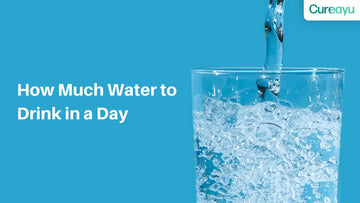Water is essential for life. It makes up a significant portion of our body and is vital for various physiological functions. However, determining the right amount of water to drink each day can be challenging. The common advice is to drink eight 8-ounce glasses of water a day, but this recommendation may not fit everyone. Individual needs vary based on several factors, including lifestyle, environment, and health status. Understanding these factors can help you tailor your water intake to your personal needs, ensuring optimal hydration and overall well-being.
Also Read: 10 Summer Safety Tips: Protect Yourself from Excessive Heat
Factors On Which Quantity Of Water Intake Depends
1. Where You Live
Geography plays a crucial role in determining water needs. People living in hot, humid, or high-altitude areas require more water due to increased sweat loss and rapid dehydration. Conversely, those in cooler climates may not need as much water to stay hydrated.
2. Season
Seasonal changes impact water requirements. In summer, higher temperatures and increased physical activity lead to more sweating and a greater need for water. In winter, while you might sweat less, indoor heating systems can still cause dehydration.
Also Read: 10 Top Cooling Herbs in Ayurveda: Beat the Heat Naturally
3. Your Diet
What you eat significantly affects your water intake needs. Diets high in salt, sugar, or protein can increase your need for water to help the kidneys process these nutrients. Conversely, diets rich in water-dense foods like fruits and vegetables contribute to your hydration.
4. Physical Activity
Active individuals require more water to compensate for fluid loss through sweat. Athletes or those engaging in intense workouts need to drink more to maintain hydration and performance levels.\
5. Health Conditions
Certain health conditions and medications can impact water needs. For example, people with kidney stones or urinary tract infections may need to drink more water. Medications that act as diuretics increase urine output, necessitating higher water intake.
Also Read: Top 10 Refreshing Summer Drinks to Keep You Cool and Energized
6. Age
Age influences hydration needs. Children are more susceptible to dehydration and often need to drink more water relative to their body weight. Older adults may have a diminished sense of thirst and need to consciously ensure they drink enough water.
7. Pregnancy or Breastfeeding
Pregnant or breastfeeding women have higher water requirements. Water is essential for amniotic fluid production and milk supply, making it crucial for mothers to stay well-hydrated.
Does More Water Help to Avoid Health Problems?
Drinking adequate water is fundamental in preventing various health issues. Proper hydration aids in maintaining bodily functions such as temperature regulation, digestion, and waste elimination. It helps prevent kidney stones, urinary tract infections, and can reduce the risk of chronic conditions like hypertension. However, while sufficient water intake is beneficial, excessive water consumption can lead to water intoxication, a potentially dangerous condition. Therefore, it's crucial to balance water intake based on individual needs rather than a one-size-fits-all approach.
Also Read: Detox Water Benefits: A Refreshing Way to Boost Your Health
Health Benefits of Drinking More Water
1. Weight Loss
Water can aid in weight loss by acting as a natural appetite suppressant. Drinking water before meals can reduce overall calorie intake. It also increases metabolism and helps in burning fat more efficiently.
2. Improved Digestion
Adequate water intake ensures smooth digestion by helping to break down food and absorb nutrients. It also prevents constipation by softening stools and promoting regular bowel movements.
3. Enhanced Skin Health
Water hydrates the skin, keeping it moisturized and radiant. Proper hydration helps flush out toxins, reducing the likelihood of acne and other skin issues.
4. Better Physical Performance
Staying hydrated is crucial for physical performance. It improves muscle function, reduces fatigue, and helps maintain energy levels during intense activities.
5. Boosted Immunity
Water helps in the production of lymph, which is vital for a strong immune system. A well-hydrated body can fight off infections more effectively.
6. Improved Kidney Function
Water is essential for kidney function, helping to filter waste from the blood and prevent kidney stones by diluting urine and reducing mineral crystallization.
7. Mental Clarity and Mood
Adequate hydration has a positive impact on brain function, improving concentration, mood, and cognitive performance. Dehydration can lead to headaches, mood swings, and impaired thinking.
Water Requirement Per Day
Determining your daily water requirement can depend on a variety of factors, as mentioned earlier. The National Academies of Sciences, Engineering, and Medicine recommends a daily water intake of about 3.7 liters (125 ounces) for men and 2.7 liters (91 ounces) for women. This includes all beverages and water content in food. Listening to your body's signals, such as thirst and urine color, can also help gauge if you need more water.
Also Read: How to Stay Hydrated in Summer
Water Intake Per Day
Average water consumption per day should be tailored to individual needs rather than following a rigid guideline. For most people, drinking when thirsty and consuming water-rich foods can be sufficient. Athletes, pregnant women, or those living in hot climates may need to drink more. Monitoring signs of dehydration like dark urine, dry mouth, and fatigue can help adjust intake accordingly.
Conclusion
Water is a fundamental component of our daily lives, essential for maintaining health and well-being. While the standard recommendation provides a baseline, individual water needs vary based on factors like location, activity level, diet, and health conditions. Ensuring adequate hydration can prevent health issues, enhance physical and mental performance, and improve overall quality of life. By understanding your body's unique requirements and staying attuned to its signals, you can achieve optimal hydration and support your long-term health.








